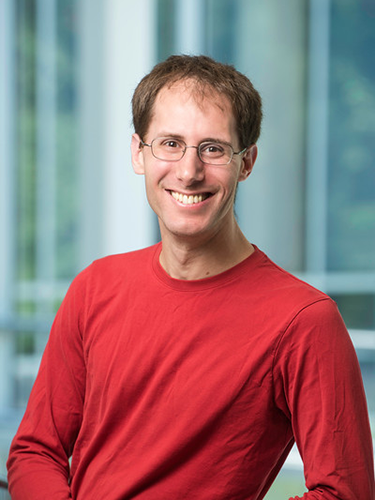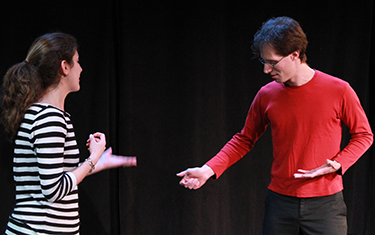Like the movie Groundhog Day, I wake up each semester and try to teach a better course.
Yotam Gingold

Yotam Gingold’s dedication to his students and his work in the classroom earned him a 2017 University Teaching Excellence Award.
Teaching a class is a lot like doing improvisational theater, says a Mason Engineering professor who does both.
With teaching, you need to listen to students’ questions during class to figure out what to emphasize in the lesson, says Yotam Gingold, an assistant professor of computer science. With improv, you have to listen to other people on the stage and collaborate with them to drive the scene forward.
“In both cases, if you come in and are too fixated on your own idea, it means you are not listening to other people and don’t care about what they are saying,” he says. “You have to care and show everybody you care, because if you don’t care, nobody else will.”
Gingold’s dedication to his students and his work in the classroom earned him a 2017 University Teaching Excellence Award from the Office of the Provost and the Center for Teaching and Faculty Excellence.
The analogy between teaching and improv only works up to a point, he says. There’s one big difference between the two: Teaching requires a great deal of planning, which he doesn’t do for his improv group, the Retrocessionists in Alexandria, Virginia.
Gingold is spending a lot of time this semester working on lesson plans and holding office hours for his 400-level computer graphics class. “Computer graphics is my passion,” he says. “What I say about computer graphics is that we are doing a little bit of math, and then we are stopping at the point where the math becomes tedious and letting the computer do it.”
One of the joys of being a professor is getting to teach new students every year, he says. “Like the movie Groundhog Day, I wake up each semester and try to teach a better course.”
Gingold often tells his students an allegory that offers insights into his view on learning. The story goes like this: A ceramics instructor tells half of the students to spend the entire semester creating a single ceramic, and they’ll be graded on its quality.
He tells the other half to create as many ceramics as possible, and they’ll be graded on the weight of the clay they use. In the end, the students who made the most ceramics also made the best ones.
The story illustrates the importance of practice and the problem with perfectionism, he says. If students become too focused on doing everything perfectly they won’t move on and try something new. The more they practice, the more they’ll learn.
This is especially true for his game design classes where the first game students make may not be very good, but by the end of the course, they’ll be creating significantly better games, he says.
Gingold likes the fact that his job is a combination of teaching and research. He studies new ways to make it easier for people to create and edit 2-D pictures and 3-D shapes on the computer.

Computer science professor Yotam Gingold says he uses some of his improvisational skills in the classroom. (Photo by Matthew O'Donnell).
Conducting research at a university is a lot like running a start-up company, he says. With both, you have to have a far-reaching idea, be willing to pivot if the original idea doesn’t pan out, raise funding, and recruit talent. If a startup succeeds, its founders may be the next Mark Zuckerberg and make billions.
His rewards are different. “Some of our work is being adopted at Adobe Research,” Gingold says. “Some of their projects are already using research my students have done.”
And there’s the positive feedback he receives about his teaching. “Yotam is one of the most creative teachers in the Computer Science Department and probably at Mason,” says Sanjeev Setia, chair of the department. “In the classroom, he uses his improvisational theater experience to engage students.”
Anthony Sermania, BS Computer Science ’16, says Gingold is “probably the most entertaining professor I've ever had and in the running for most energetic. He's very passionate about the subjects he teaches.”
Gingold says there is plenty of laughter in his classes, but he doesn’t tell canned jokes. “One of the things they teach you in improv is not to try to be funny, and the humor will just emerge. If you are trying to be funny, you end up with lots of bad jokes, and lame jokes are not funny.
“You earn humor with breaking that tension with something surprising. I can’t script a joke.”
Computer graphics is my passion. What I say about computer graphics is that we are doing a little bit of math, and then we are stopping at the point where the math becomes tedious and letting the computer do it.
Yotam Gingold
